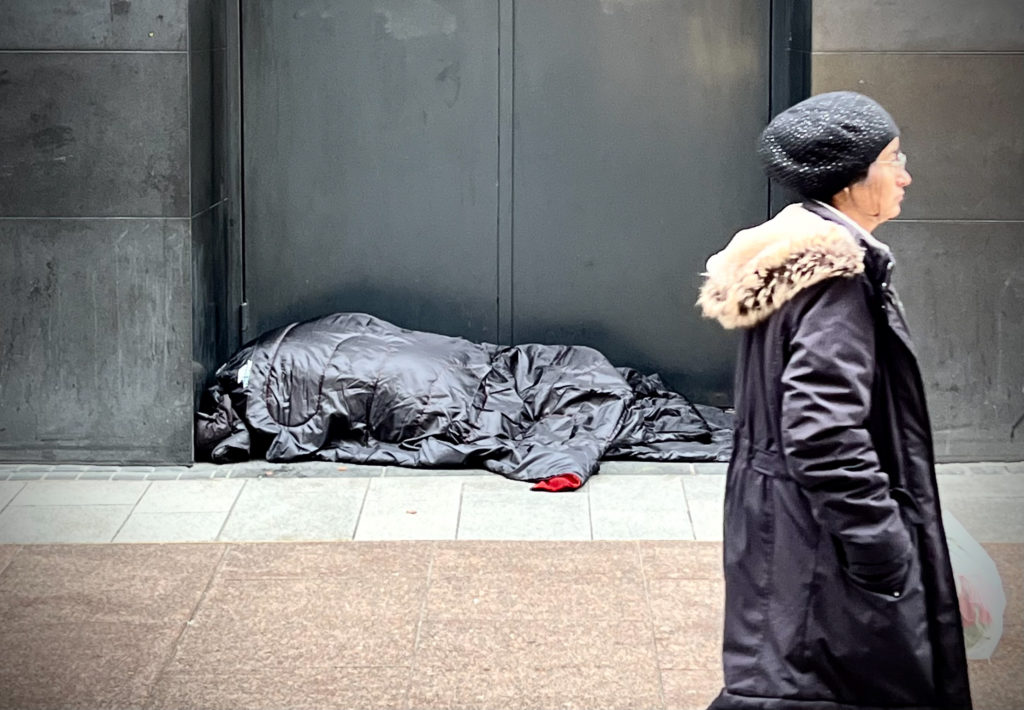A ‘CLEAR LINK’ has been found between homelessness and human trafficking in Ireland.
Research, commissioned by London-based homeless charity The Passage, reveals that homelessness organisations in Dublin are “coming into contact with potential victims of trafficking” similar to that being experienced in England.
In 2017, The Passage was commissioned by the UK’s first Independent Anti-Slavery Commissioner to produce a report into the links between homelessness and human trafficking across London.
The study found that “traffickers identify and exploit people experiencing homelessness, and those rough sleeping are at greater risk of becoming victims of human trafficking”.
Evidence also showed “many who escape human trafficking end up as street homeless and then enter a cycle of susceptibility to being trafficked” the charity explained.
This year, The Passage undertook a similar study in Dublin to ascertain whether the same issues are being faced in other international cities.
Partnering with Depaul Ireland, the charity conducted research with a number of homelessness organisations in operation across the Irish capital to explore potential links between homelessness and human trafficking in Ireland.
Released this week, the Dublin report “identified clear links between homelessness and human trafficking, akin to the situation in London”.
It found that due to an “awareness and data gap” on trafficking within those organisations, it “was not possible to identify the true scale of the issue” in Ireland.
 A rough sleeper on Henry Street in Dublin
A rough sleeper on Henry Street in Dublin“Human trafficking is becoming more prevalent in Ireland and the aim of this research is to shine a light on this issue in the context of trafficking and homelessness,” David Carroll, Chief Executive of Depaul, said this week.
“The report highlights the need to not only to identify victims, but to be able to link these victims into crucial support services which are only at the beginning of development,” he added.
“Every gender and every nationality can be a victim of this destructive crime. No community is immune to it.”
Among the case studies that feature in the report is the experience of an African woman who came into contact with a homelessness organisation in Dublin after being placed in single-sex homelessness accommodation through the city’s central placement service.
After staying with the organisation for a while, she reported having been kidnapped from her village and forced into prostitution.
“The experiences that she disclosed having had in the past to her support staff were hugely traumatic, and she alluded to having had more experiences that she could not speak about, all of which had a significantly negative impact on her mental health,” the report states.
“This was one of the first times the organisation realised they might be coming into contact with people who had been victims of trafficking but did not have knowledge about the indicators of trafficking, the support pathways available or ways to approach these topics with people in their services.”
The report also highlighted that homelessness organisations in Dublin were also coming into contact with Irish nationals who had been trafficked.
Kevin Hyland, who was the UK’s first Independent Anti-Slavery Commissioner, but is now the Global Strategic Director for The Santa Marta Group and also Ireland’s representative on the Council of Europe, was also interviewed for the report where he raised the issue that Irish nationals are also victims of human trafficking.
Ireland’s Department of Justice’s 2022 report showed that Irish nationals were the 6th highest recorded nationality when looking at recorded data for trafficking in 2021.
Mr Hyland said “there may be a tendency to view human trafficking as a crime that only impacts on those from another country, which could lead to Irish nationals who maybe victims of human trafficking being missed”.
The Passage report on human trafficking and homelessness in London highlighted multiple cases of Irish people being trafficked.
“Since 2018, The Passage has identified and supported five Irish nationals who have been victims of trafficking,” the report confirms.
“These were four males and one female, who were between 25 and 49 years old,” they explained.
“Three of them experienced mental health issues as a result of the exploitation.
“Three of these were cases of labour exploitation – in agriculture, and one was a case of labour exploitation – in agriculture, construction iand n private houses – as well as forced marriage.
“The final case was of historic child slavery for forced criminality – namely forced begging - and domestic servitude which later also resulted in forced marriage.
“Four of the five were rough sleeping at the time of recruitment and one was living with their family when exploitation started, but they all became homeless as a result of their exploitation,” the report added.
The report authors have called for better training and awareness raising for staff at homelessness organisations.
“It appears that knowledge and understanding about the forms of trafficking and exploitation and how and where it can take place are limited, which has an impact on how effectively homelessness organisations are able to identify potential victims,” they state.
“Homelessness organisations - both in the statutory and voluntary sectors - should ensure that adequate training on human trafficking, including on how to spot the signs, how to report it and what support to offer, is a key part of induction and staff development programmes,” they add.

